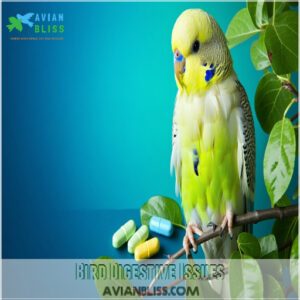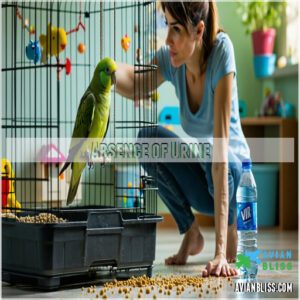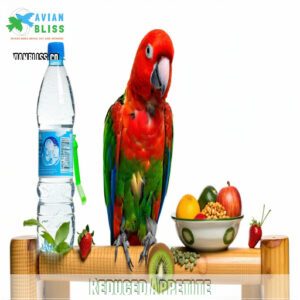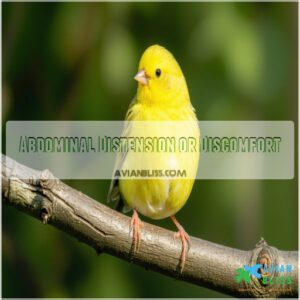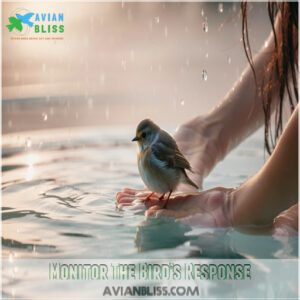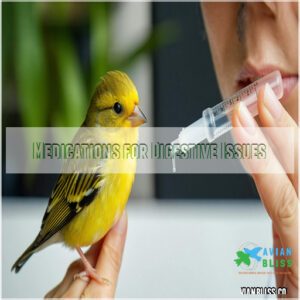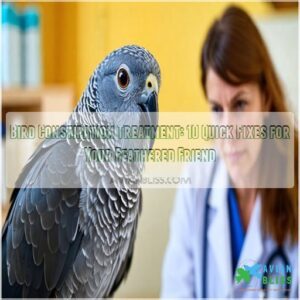This site is supported by our readers. We may earn a commission, at no cost to you, if you purchase through links.

For Avian Gastric Yeast (AGY), antifungal treatments like Megabac-S are often prescribed.
Candidiasis, common in young or stressed birds, may require antifungal medications such as Nystatin.
Gastrointestinal parasites, like Giardia or roundworms, call for targeted antiparasitic drugs—your vet will guide you here.
Constipation? Start with hydration, fiber-rich foods, and probiotics to support gut health.
Always consult a vet for proper dosages and personalized care.
Birds can be surprisingly delicate, so don’t wing it—professional advice guarantees their safety.
Curious about natural remedies or diet tweaks? Stay tuned!
Table Of Contents
- Key Takeaways
- Bird Digestive Issues
- Causes of Constipation
- Recognizing Constipation
- Warm Water Treatment
- Alternative Treatment Methods
- Medications for Digestive Issues
- Frequently Asked Questions (FAQs)
- Should you use antibiotics if your pet bird is ill?
- What medicines are used to treat gastroesophageal reflux disease?
- Can you give a bird a laxative?
- How do you care for a bird with a gastrointestinal illness?
- Can homeopathic treatments help a bird’s constipation?
- How to prevent bird constipation?
- How can I improve my bird’s digestion?
- What is the best medicine for digestive problems?
- What is the medicine for bird diarrhea?
- What medicine is good for sick birds?
- Conclusion
Key Takeaways
- Keep your bird hydrated and offer fiber-rich foods like fresh veggies and soaked seeds to prevent constipation and support digestion.
- Use medications like Megabac-S for Avian Gastric Yeast or Nystatin for Candidiasis, but always consult your vet for proper diagnosis and dosage.
- Watch for signs like weight loss, regurgitation, or changes in droppings to catch digestive issues early and act promptly.
- Probiotics and regular exercise can improve gut health and prevent recurring digestive problems in your feathered friend.
Bird Digestive Issues
Your bird’s digestive system plays a critical role in their overall health, but it’s surprisingly fragile.
From yeast infections to parasitic invaders, understanding the causes of these issues helps you recognize symptoms early and seek proper care.
Avian Gastric Yeast
When your bird’s immune system takes a hit, Avian Gastric Yeast (AGY) can sneak in and wreak havoc on their digestive system.
This pesky Macrorhabdus ornithogaster infection primarily affects smaller companion birds, causing some telltale signs you’ll want to watch for:
- Chronic weight loss even though they’re eating normally
- Regurgitation of food and undigested seeds in droppings
- A noticeable dip in energy and appetite that won’t bounce back
It’s vital to understand digestive disorders to provide the best care for your bird.
Candidiasis
Unlike AGY, Candidiasis (also known as bird thrush) targets young or immunocompromised birds, especially those on antibiotics.
This yeast infection, caused by Candida, can spread through your bird’s digestive system like wildfire.
Watch for signs like regurgitation and appetite loss, and your vet can spot this avian fungus through microscopic examination and prescribe targeted bird antibiotic treatments.
While maintaining good hygiene helps prevent future infections, it is crucial in managing yeast infection.
Avian Ganglioneuritis
When your feathered friend shows signs of Proventricular Disease, you’re facing a complex challenge.
This condition, caused by Avian Bornavirus, triggers autoimmune reactions that affect your pet’s digestive system.
You’ll notice chronic weight loss and undigested food in droppings as the virus disrupts normal gut function.
While there’s no cure, early treatment with anti-inflammatory medications and easily digestible foods can help maintain your companion’s bird digestive health.
Understanding the avian bornavirus research is essential for developing effective treatment plans for affected birds.
Gastrointestinal Parasites
While examining microscopic threats to your pet’s intestinal health, gastrointestinal parasites emerge as common troublemakers.
These gut infections can seriously impact your bird’s well-being.
Here’s what you need to watch for:
- Giardiasis causing diarrhea and nutrient absorption issues
- Trichomoniasis creating whitish-yellow mouth lesions
- Roundworms leading to weakness and weight loss
- Tapeworms appearing as segments in droppings
- Protozoa management requiring specific medications for effective parasite control
Causes of Constipation
If your feathered friend hasn’t produced droppings in a while, you’ll need to examine several potential causes, from simple dehydration to more complex digestive issues.
You can often prevent constipation in your pet bird by ensuring proper hydration, offering a fiber-rich diet, encouraging regular exercise, and watching for any unusual items they might try to eat.
Dehydration
Every day, maintaining proper fluid balance in your bird’s body is essential for digestive health.
When your bird’s water intake drops, it affects electrolyte levels and slows down the avian digestive system.
You’ll notice your bird’s droppings becoming dry and compact, a clear sign of dehydration.
If left untreated, dehydration can lead to bird constipation, requiring fluid therapy or bird medications for relief.
Inadequate Diet
Just as water keeps your bird’s system flowing, proper nutrition plays a starring role in digestive health.
Your bird’s digestive system needs fiber-rich foods to function smoothly – not just dry seeds.
Mix in fresh fruits, veggies, and sprouted seeds to prevent malnutrition risks and digestive issues.
Balance is key: varied nutrients help avoid nutrient deficiencies that can slow down the digestive process.
Lack of Exercise
Your bird’s digestive health relies heavily on regular physical activity.
When birds live a sedentary lifestyle without enough exercise routines, their digestive enzymes don’t function properly, leading to bird constipation and other digestive issues.
Just like humans, avian fitness impacts gut health – lack of movement slows down their metabolism and reduces fiber absorption, which is why regular physical activity is crucial.
Create opportunities for flight, climbing, and play to keep your bird’s digestive system running smoothly.
Ingestion of Indigestible Substances
Curious feathered friends often explore their world with their beaks, leading to swallowed objects and digestive blockage.
When your pet ingests indigestible substances like plastic, fabric, or even polyacrylamide gel, they can face serious intestinal obstruction .
You’ll notice increased thirst and fluffed-up appearance as first signs of foreign bodies causing trouble.
Watch out for pieces of wood, paper, or other non-food items that could block their digestive system.
Medical Conditions
While your digestive health birds might seem fine on the surface, underlying medical conditions can trigger constipation.
Common culprits include avian infections, cloacal problems, and egg-binding in female birds.
You’ll need to watch for signs like pungent droppings and unusual firmness.
Conditions such as avian ganglioneuritis can affect your bird’s gut health by disrupting normal digestive functions, making prompt veterinary care essential.
Recognizing signs of bird constipation is vital for effective bird constipation treatment, and this is crucial for effective treatment.
Recognizing Constipation
You’ll know your feathered friend is constipated when you notice changes in their droppings, including reduced frequency or complete absence of waste, along with visible signs of straining during attempts to defecate.
If you spot your bird sitting fluffed up with a bloated tummy or showing less interest in their favorite treats, it’s time to pay closer attention to their digestive health.
Lack of or Changes in Droppings
Monitoring droppings tells you volumes about your feathered friend’s digestive health.
Keep an eye out for changes in color – yellow or orange might signal liver troubles, while red hints at intestinal bleeding.
When you spot whole seeds or undigested food in their droppings, it could mean crop infections or blockages.
Unusually watery droppings often point to bacterial infections, while increased urates suggest dehydration.
Straining or Difficulty Defecating
Watching your feathered friend strain during bathroom breaks can be distressing.
When you notice defecation pain or abdominal strain, it often signals bird constipation or gut motility issues.
Look for signs like your pet pushing unusually hard, appearing uncomfortable, or spending more time than normal in their "bathroom spot."
In severe cases, fecal impaction or bowel obstruction can lead to cloacal prolapse, requiring immediate veterinary care.
Absence of Urine
The absence of urine in your bird’s droppings signals potential urinary tract issues that need attention.
When checking the cage floor, you’ll notice droppings lacking the usual clear fluid component, which indicates problems with kidney function and fluid balance.
- Your heart sinks when spotting those chalky, urine-free droppings
- The worry builds as you notice your feathered friend’s unusual bathroom habits
- Relief comes from knowing early detection leads to successful treatment
Watch for dehydration effects and urine retention, as they’re key indicators of bird constipation requiring prompt care.
Reduced Appetite
Your bird’s eating habits can tell quite a story about their health.
When constipation strikes, you’ll notice food refusal and loss of appetite becoming more common signs.
Take note if your feathered friend seems listless around mealtime or shows unusual hunger signs without actually eating.
These nutrition deficits, especially when paired with digestive problems, need attention – your bird’s health depends on catching these changes early.
Abdominal Distension or Discomfort
A full belly isn’t always a happy one regarding gut health.
Look for a noticeably swollen or tight abdomen in your feathered friend, which often signals digestive issues.
Your pet might show signs of discomfort through listlessness or reluctance to move.
Bird bloating and abdominal distension can stem from various stomach problems, including infections, egg binding, or trapped gas.
Don’t wait to consult your vet for proper bird constipation relief.
Warm Water Treatment
You’ll find warm water treatment to be one of the gentlest yet effective methods for relieving your bird’s digestive discomfort.
Just as you’d appreciate a soothing bath when you’re not feeling well, your feathered friend can benefit from a carefully prepared lukewarm soak that helps stimulate their natural digestive processes, which is a key aspect of digestive discomfort relief.
Prepare Warm Water
Before starting your bird’s warm water treatment, carefully test the water temperature with your finger – it should feel comfortably lukewarm to prevent any discomfort or stress.
Monitor the water temperature throughout the soaking session to maintain ideal conditions for your feathered friend’s hydration and relaxation.
- Use a reliable thermometer to maintain consistent water temperature between 98-100°F
- Keep fresh, room-temperature drinking water readily available for after-treatment hydration
- Consider gentle misting as an alternative hydration method for temperature-sensitive birds
Create a Soaking Area
Your soaking area design needs to prioritize your feathered friend’s comfort and safety.
Choose a shallow dish with a non-slip liner at the bottom to prevent slipping while addressing bird digestive issues.
For ideal soak area design, place clean towels around the container to catch splashes and maintain proper water temperature.
You’ll also want to position the setup in a quiet, draft-free space for maximum relaxation benefits.
Introduce The Bird to The Soaking Area
During a warm part of the day, gently lower your feathered friend into the lukewarm water, keeping water at chest height.
Use water temperature that’s neither too hot nor cold to prevent system shock.
Support their body while introducing them to the soaking area—think of it as a therapeutic spa for bird digestive issues.
Let them inspect their surroundings first, just like with spray bottles.
Encourage Relaxation
Peace and quiet make all the difference for your feathered friend during treatment.
Create a calming atmosphere with these relaxation methods that’ll help your bird feel at ease:
- Play soft classical music or nature sounds to reduce stress
- Use gentle stroking and bird massage techniques to promote comfort
- Speak in hushed, soothing tones while maintaining a calm energy
- Consider natural bird digestive aids like chamomile tea
Your steady presence and these calming techniques will help your bird feel safe and supported throughout the process.
Monitor The Bird’s Response
While your bird soaks in warm water, carefully track their Response Tracking for signs of comfort or distress.
Here’s what to monitor:
| Behavior Signs | Health Indicators |
|---|---|
| Relaxed posture | Normal breathing |
| Gentle movements | Clear eyes |
| Active preening | Alert responses |
Watch for Bird Behavior changes indicating Recovery Signs. If you notice digestive supplements birds aren’t helping or spot bird diarrhea treatment needs, contact your vet.
Bird gut health improvements often show through calmer demeanor and improved droppings.
Alternative Treatment Methods
You’ll be relieved to know there are several effective natural remedies you can try before turning to medications for your bird’s digestive issues.
From adjusting your feathered friend’s diet to introducing probiotics, these gentler approaches often work wonders for mild digestive problems while supporting your bird’s overall health.
Increase Hydration
Whether it’s a comfy bath or a rejuvenating drink, proper fluid balance keeps your feathered friend thriving.
To boost water intake and prevent dehydration, try offering multiple water sources and monitoring drinking frequency throughout the day.
You’ll want to maintain healthy electrolyte levels with vet-approved hydration methods – some birds can be picky drinkers, so electrolyte water might help entice them.
Providing fresh water in Bird Water Bottles is essential for maintaining their overall health.
Dietary Modifications
Getting your feathered friend’s digestive system back on track starts with smart dietary modifications .
High-quality pellets should make up 60-70% of their daily food intake, supporting proper nutrient balance and gut health .
Here are the top foods to boost digestive enzymes and fiber intake:
- Fresh vegetables like broccoli, carrots, and Swiss chard
- Nutrient-rich fruits including papaya and berries
- Probiotic-enhanced pellets for ideal digestion
Mix these carefully to prevent bird digestive upsets.
Soaked or Sprouted Foods
The natural seed germination process reveals a treasure trove of nutrients for your feathered friend.
Through food hydration and sprouting, you’ll boost digestive ease by converting stored energy into highly bioavailable nutrients.
You can find a variety of bird seed soaking products online.
Your bird’s healthy gut will thank you, as soaked seeds mirror their wild diet .
Start by soaking seeds for 12 hours, then rinse thoroughly to jumpstart the nutrient boost .
Probiotics and Digestive Enzymes
Supporting your feathered friend’s gut health is like giving them a superhero squad for their digestive system.
Avian probiotics and digestive enzymes work together as a powerful team.
For ideal digestion, consider a balanced diet for birds.
Here’s why you’ll want to add these supplements to your bird’s daily routine:
- Promotes balanced gut flora with 550 million CFU/g of friendly bacteria
- Enhances nutrient absorption and digestive efficiency
- Supports recovery from stress and illness
- Contains 9 beneficial bacteria strains for immune support
- Helps break down food components effectively
Encourage Physical Activity
To complement digestive enzymes and gut health support, physical activity plays a key role in your bird’s digestive wellness.
Here’s how you can boost their activity levels:
| Exercise Type | Benefits | Implementation |
|---|---|---|
| Foraging | Stimulates natural behaviors, aids digestion | Hide treats in toys |
| Flight Time | Strengthens muscles, promotes metabolism | Create safe flight paths |
| Interactive Play | Enhances environmental enrichment | Use bird toys daily |
| Social Activities | Reduces stress, encourages movement | Schedule playtime routines |
Remember to gradually increase activity levels while monitoring your bird’s response, ensuring their exercise routines align with their species-specific needs.
Medications for Digestive Issues
You’ll find several effective medications available to help your feathered friend overcome digestive issues, including water-soluble treatments and specialized supplements designed for avian health.
When your bird shows signs of digestive distress, these medications can provide quick relief while working with your veterinarian to address the underlying cause.
Megabac-S Medications
MegabacS stands as your bird’s shield against digestive troubles, with a proven water-soluble formula for ideal avian digestive health.
For convenient access to this avian health solution, explore these Megabac-S product options.
Mix one-quarter teaspoon with 4 fl oz water for effective gut health support, which is gentle on bird medications yet powerful against digestive issues. Your feathered friend’s recovery starts with this 10-day avian treatment, which helps 140 budgies per bottle.
Lewerstim Supplements
Your bird’s liver health matters just like yours does.
Lewerstim stands out as a unique avian supplement, combining thioctic acid with liver extract and B-complex vitamins.
You’ll find this liver support powerhouse helps protect and detoxify your feathered friend’s system.
Mixed into drinking water, it’s particularly valuable for older birds showing signs of liver stress.
Think of it as a wellness shield for your bird’s digestive health.
Maintaining a healthy gut involves understanding the importance of balanced diet essentials to support overall avian well-being.
Antibiotics for Infections
Treating bacterial infections in your feathered friend’s digestive system requires careful antibiotic selection .
Veterinarians often prescribe specific medications based on infection type and bird species to maintain ideal gastrointestinal health .
- Enrofloxacin effectively penetrates tissues for systemic infections
- Amoxicillin targets common bacterial strains
- Doxycycline helps with resistant infections
- Trimethoprim-sulfa combinations fight multiple pathogens
- Professional veterinary guidance prevents antibiotic resistance
Dosage Considerations
Your feathered friend’s medication needs depend on precise dosing calculations based on weight and species.
Timing your bird medications right makes all the difference in their effectiveness.
Consider these key factors for ideal bird gut health:
| Species Size | Weight Range | Administration Methods |
|---|---|---|
| Small Birds | 30-100g | Oral/Water-Based |
| Medium Birds | 100-300g | Direct/Food-Based |
| Large Birds | 300-1000g | Injectable/Oral |
| Extra Large | 1000g+ | Specialized Dosing |
| Specific Cases | Varies | Custom Methods |
When calculating dosage timing, multiply your pet’s weight by 0.75 for accurate treatment duration.
Veterinary Guidance
In regards to bird gastrointestinal health, an avian veterinarian is your best ally.
They’ll pinpoint issues with medical diagnostics and create customized treatment plans.
Keep an eye out for persistent symptoms like diarrhea or regurgitation.
- Schedule regular vet consultations.
- Follow their advice on bird medications or digestive enzymes birds need.
- Discuss dietary adjustments.
- Prioritize professional guidance for bird health tips.
In following these steps, you ensure your bird receives the best possible care, guided by expert avian veterinarian advice.
Frequently Asked Questions (FAQs)
Should you use antibiotics if your pet bird is ill?
If your bird’s sick, antibiotics might help, but don’t wing it.
They only work for bacterial infections, not viruses.
Always consult an avian vet first to avoid resistance or harming your bird’s delicate system.
What medicines are used to treat gastroesophageal reflux disease?
For gastroesophageal reflux disease, medications like proton pump inhibitors (PPIs) or H2 blockers reduce stomach acid.
Antacids offer quick relief, while prokinetics improve digestion.
Always consult your doctor to tailor treatment to your needs.
Can you give a bird a laxative?
You shouldn’t give birds human laxatives—they’re not safe.
Instead, boost hydration, offer fiber-rich foods like leafy greens or soaked seeds, and try a gentle belly massage.
If constipation persists, consult an avian vet immediately.
How do you care for a bird with a gastrointestinal illness?
Monitor their droppings, offer fiber-rich foods, and keep them hydrated.
Clean their cage thoroughly to prevent reinfection.
If symptoms persist, consult a vet for diagnosis and treatment.
Birds thrive with quick action and attentive care!
Can homeopathic treatments help a bird’s constipation?
Homeopathic remedies might help mild bird constipation, but they’re no substitute for proper care.
Boost hydration, tweak diet with fiber-rich foods, and consult a vet for persistent issues.
Birds deserve safe, proven solutions over guesswork!
How to prevent bird constipation?
Think of bird care like tuning a delicate instrument—hydration, fiber-rich foods, exercise, and a clean environment keep things humming.
Watch for subtle changes in droppings and act fast to avoid constipation hiccups.
How can I improve my bird’s digestion?
Boost your bird’s digestion by offering fiber-rich fruits, soaked seeds, and probiotics.
Make certain clean water, proper hydration, and frequent exercise are provided.
Watch for changes in droppings, and consult your vet for persistent digestive troubles.
What is the best medicine for digestive problems?
When your bird’s tummy feels like a rollercoaster, try Megabac-S for avian gastric yeast or Lewerstim for liver support.
Always consult your vet for proper diagnosis and treatment suited to your feathered friend’s needs.
What is the medicine for bird diarrhea?
For bird diarrhea, a vet-prescribed medication like probiotics or antifungals (e.g., Nystatin for yeast infections) is key.
Pair it with hydration, proper diet, and cage hygiene to support recovery and prevent relapses.
What medicine is good for sick birds?
You might worry about giving the wrong medicine, but for sick birds, consult an avian vet first.
Medications like Megabac-S (for yeast) or probiotics help, but professional guidance guarantees safe, effective treatment customized to your bird.
Conclusion
Caring for your bird’s digestive health isn’t rocket science, but it’s close!
Understanding the causes, symptoms, and treatments—from antifungals like Megabac-S for Avian Gastric Yeast to probiotics for constipation—can make all the difference.
Always consult your vet before trying bird medications for digestive issues to guarantee safety and proper dosages.
Small changes, like hydration and dietary tweaks, often work wonders.
With patience and professional guidance, you’ll help your feathered friend feel their best in no time.
- https://www.msdvetmanual.com/bird-owners/disorders-and-diseases-of-birds/digestive-disorders-of-pet-birds
- https://www.petemergencyacademy.com/topic/gastrointestinal-problems-in-birds/
- https://www.woodhousespas.com/
- https://www.chop.edu/health-resources/food-medicine-probiotic-foods
- https://www.webmd.com/digestive-disorders/constipation-relief-tips

